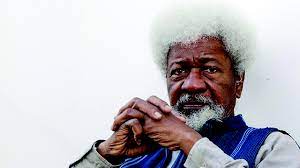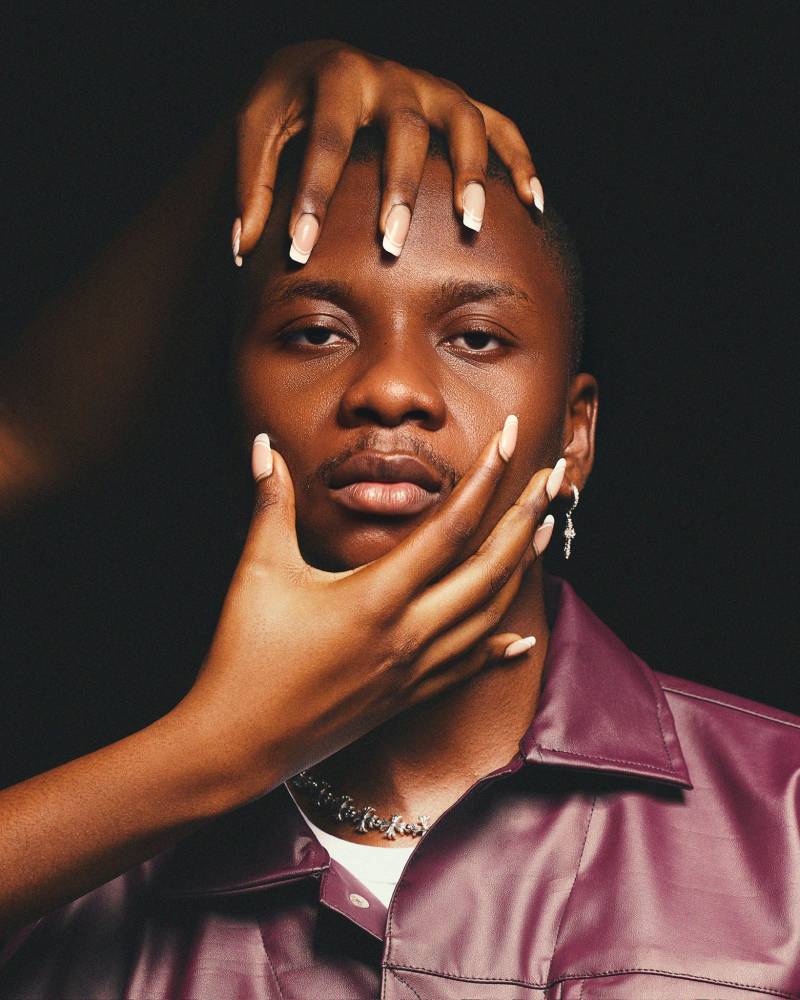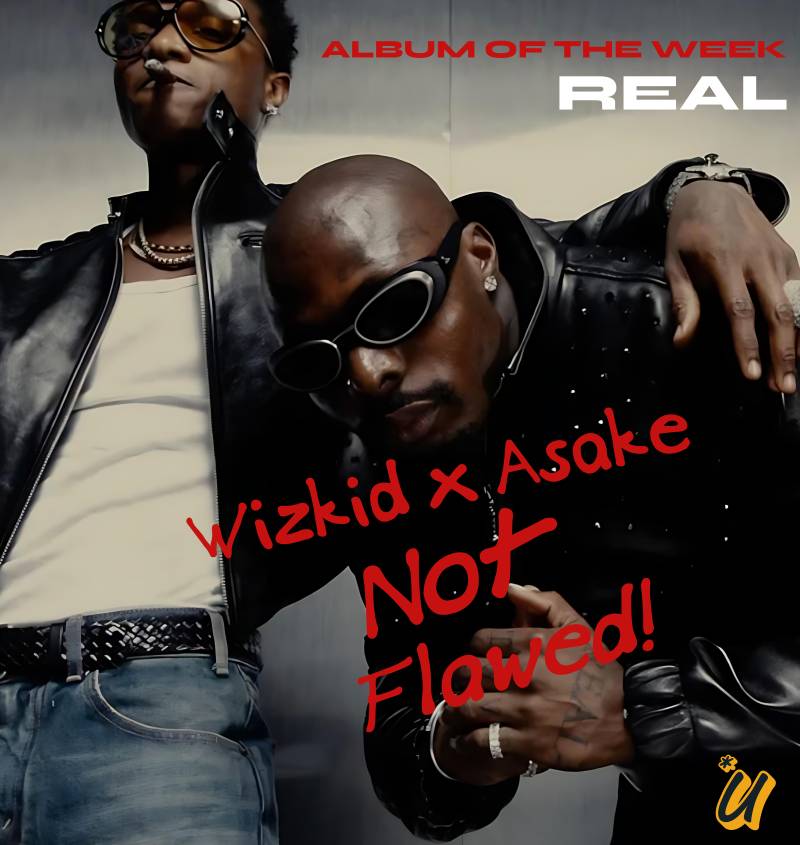The Nobel laureate, whose new novel, “Chronicles From the Land of the Happiest People on Earth,” is his first in nearly 50 years, refuses to back down when he senses that his homeland’s freedom is under threat.
“Unfortunately, some of us are not very wise. We know what we ought to do, when we should retire, go and hide out somewhere, live a life of ease,” Wole Soyinka said. “But we don’t take our own advice, do we?”
“Unfortunately, some of us are not very wise. We know what we ought to do, when we should retire, go and hide out somewhere, live a life of ease,” Wole Soyinka said. “But we don’t take our own advice, do we?”Credit...Yagazie Emezi for The New York Times
Like the time he held up a radio station to keep it from broadcasting what he said were fake election results, and got jailed for it. Or when he sneaked into Biafra at the height of its war for independence from Nigeria, and spent two years in solitary confinement after calling for an end to the fighting.
When the first Black winner of the Nobel Prize in Literature — and its first African winner — senses that things like freedom and democracy are under threat in the beloved nation whose history has intertwined with his own, he can’t help it. He has to get involved.
“It’s a temperament,” Soyinka, 87, said during an interview in Abeokuta, his hometown in southern Nigeria.
He calls this brick house, surrounded by forest and birdsong, his sanctuary. His voice, a deep, distinguished lilt, evokes the hypnotic plays for which he is best known, one moment solemn, the next lighthearted. His shirt, unbuttoned almost to the waist, hints at his reputation as a rebel, the one who tore up his U.S. green card after Donald Trump became president, the one who calls his own country’s president “the Rip Van Winkle of Nigerian history” and Uganda’s a “shameless geriatric.”
He pokes fun at himself for this temperament, this urge to speak his mind.
“Unfortunately, some of us are not very wise. We know what we ought to do, when we should retire, go and hide out somewhere, live a life of ease,” he said, smiling, as we sat in cane armchairs in an elevated, open gallery. “But we don’t take our own advice, do we? It’s a mystery to me.”
Last year, thinking he needed a change from a long spell being “locked down, and locked at my desk,” he almost directed his 1975 play “Death and the King’s Horseman” in Lagos, only realizing after a few readings that he didn’t want to do it.
Directed instead by his friend, the Nigerian movie and theater director Bolanle Austen-Peters, the play, with its tale of a king’s chief who must die when his master does, felt like a gift amid the dearth of theater and performances during the pandemic. Decades after he wrote it, the Lagos audience, on the May evening I attended, cheered and cried their way through a work ringing with Soyinka’s voice, somehow both forbidding and delicate. He “fashions the drama of existence,” the Nobel committee wrote in 1986.
Sometimes the firebrand temperament distracts from the writing. To his longtime editor, Erroll McDonald, however, they coexist. “They feed off each other,” he said. “It is impossible to think of one without the other.” And Soyinka the activist does seem to keep providing Soyinka the writer with material.
Not least for his latest work, “Chronicles From the Land of the Happiest People on Earth,” his first novel in nearly 50 years, which Pantheon will publish in the United States on Tuesday. Its careering plot twists, spirited cast of characters and sinister themes — a corporation that sells human body parts, a false prophet who uses elements from different religions to suit his purposes — might seem unlikely, but they are less so for someone in an intimate relationship with Nigeria.
Intimate, and stormy.
Born in Ibadan, Soyinka was brought up by loving Christian parents and a grandfather who, Soyinka said, confirmed that he was a child of Ogun, the Yoruba deity of poetry, blacksmiths and palm wine. Ogun is Soyinka’s muse.
He studied in Britain, the country that colonized Nigeria, and when he returned on New Year’s Day 1960, it was in the process of becoming independent. He threw himself into exploring and growing his newly free home.
But it wasn’t long before its new politicians let him down, and he got wind of electoral fraud in western Nigeria. Forcing the radio announcer to read a message denouncing fraud at gunpoint was his first dramatic attempt to hold the country’s politicians to account, but it was only the beginning of a lifelong struggle.
“He’s almost untouchable, because he’s paid his price, and he’s also recognized internationally,” Austen-Peters said. “He’s got a lot of things going for him.”
Several times, Soyinka has had to sneak out of Nigeria and into exile, his life in danger because he spoke out against the politicians of the day. (Once, he sneaked into Nigeria from neighboring Benin.)
In 1994, pursued by the military dictator Sani Abacha, he fled Abeokuta, clinging to the back of a motorbike for 10 hours. He made an oath that night, as he headed into exile on dirt tracks through the forest, his cloud of hair — so iconic it’s even had a band named after it — filling with bugs.
Wole Soyinka in 1998, fielding questions from journalists after returning to Nigeria.Credit...Pius Utomi Ekpei/Agence France-Presse — Getty Images
Soyinka remembered the oath later in his 2006 memoir, “You Must Set Forth at Dawn”: “If I should die outside my own borders, bury me in whatever alien land I expired — as long as Sani Abacha still bestrides the nation at my time of death!”
It was a crushing decision. Tucked away in his bit of forest in Abeokuta, the city patched between towering granite outcrops that he’d just fled, was a small cactus patch. Soyinka comes back to it over and over in his writing. It is where he wants to be buried.
“I carried Nigeria with me during that period,” he said. But in exile, he had no idea if he would ever be able to return, alive or dead.
In his absence, he was charged with treason. But just as he was settling in for the long haul in exile, Abacha died. Soyinka returned from exile in the West, numb.
In a way, Soyinka seems more worried about Nigeria’s future today than under Abacha. To him, the nature of the threat has changed.
“Something has happened to the quality of sensibility in this nation,” he said. “I haven’t put my finger on it completely. But something has given in this nation. Something has derailed.”
Austen-Peters, the theater director, echoed this feeling. “The problem is endemic, it’s been there, it’s just getting bigger and bigger and bigger,” she said. “And we don’t have institutions anymore. All the institutions that took care of Nigeria, everything is broken down.”
Indeed, Africa’s most populous nation, a country of incredible diversity in so many ways — language, religion, ethnicity, landscape — has over the past decade or so been wracked by one crisis after another. Boko Haram and its powerful offshoot, Islamic State West Africa Province, have plagued the northeast, killing tens of thousands of civilians. Mass kidnappings have become a common occurrence in the northwest. Clashes between herdsmen whose cattle destroy farmlands and farmers who expand their fields into traditional herding corridors have become a fraught political issue. Security forces target civilians, including so many young people that last year, not long after Black Lives Matter protests occurred across America, they rose up in a movement known as EndSARS. (SARS refers to Nigeria’s Special Anti-Robbery Squad, the police unit that protesters accused of abuses.)
EndSARS protesters begged Soyinka to join their marches, he said. His conditions were:
An electric wheelchair
That was tear-gas-proof
With a fully stocked bar.
In “You Must Set Forth at Dawn,” he quotes a proverb of the Yoruba, the ethnic group to which he belongs, to the effect that as one becomes an elder, one ceases to indulge in battles.
“Some hope!” he writes. “When that piece of wisdom was first voiced, a certain entity called Nigeria was not yet thought of.”
The prestige of the Nobel amplifies his voice in those battles, though, and he feels a responsibility to use it. He sometimes mourns the anonymity that was obliterated when he received the prize and occasionally dreams of recovering that anonymity. But not always to lasting success.
“I know, I know, I know. I’ve announced a number of times I’m withdrawing from public life. And I meant it! For about 24 hours,” Soyinka said. “I’m never going to say it again. I’m just going to sneak out quietly — and nobody will see me again. You wait.”




